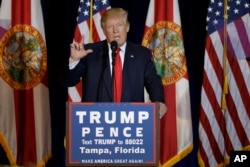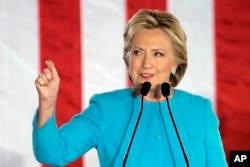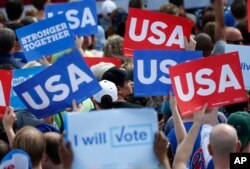On Tuesday, sharply divided U.S. voters head to the polls to elect a new president. In many ways, the choice between Democrat Hillary Clinton and Republican Donald Trump is emblematic of a political polarization in the United States that has been building for decades.
Many experts warn that sharp divide is not likely to ease no matter who is elected on November 8th.
In the final hours before Election Day, Clinton and Trump made a furious last-minute push for votes, trying to ensure their core supporters get out to the polls.
Trump focused much of his time on the key swing state of Florida, a state he needs if he has any chance of reaching the 270 electoral votes needs to win the presidency.
"We are on the cusp of an incredible, historic change that transfers power from a failed political establishment and returns that power to our families, communities and citizens, to you," Trump told supporters at a rally in Miami in the final days of the campaign.
Clinton and surrogates like her husband, former President Bill Clinton, and President Barack Obama sought to shore up Democratic-leaning states like Pennsylvania and Michigan in the final days of the campaign.
But Hillary Clinton also made a last-minute pitch in Arizona, which traditionally has supported Republican presidential candidates.
"And when your kids and grandkids ask what you did in 2016 when everything was on the line, I want you to be able to say, I voted for a better, stronger, fairer America,'" Clinton exhorted supporters at a rally in Phoenix.
Clinton hopes to re-energize the coalition that elected Obama twice, Republican strategist John Feehery said. "It is a liberal, progressive party of coalitions, ethnic coalitions. And the Republican Party is a coalition of basically white voters of various stripes of conservatism," he said.
The partisan lean of most voters in recent years makes it challenging for any candidate to win over members of the other party, according to election expert Jennifer Lawless of American University in Washington, D.C.
"We have gotten past the point now where people who are partisans, who identify as strong or leaning partisans, will cross party lines, either because of the sex of the candidate or some unappealing feature," Lawless said.
Partisan divide
Trump supporters may not like everything he says, but they are hanging with him all the way to the end, says northern Virginia businessman Bryan Crosswhite. "So yes, we need to make America great again. We need to think about ourselves and our citizens and make our country what it used to be," he said.
But Clinton supporters are focused on the election stakes in the final hours as well, including West Virginia University student Emma Harrison.
But Harrison acknowledged that even trying to talk to fellow students about this year's election can be a challenge. "Just like the two parties, people are really polarized. So if you are in the middle, people generally just don't talk about it because they think of it as the lesser of two evils."
No matter the outcome on Tuesday, analysts caution that the partisan divide that has been growing for years is not likely to go away.
"I think no matter which candidate wins, the political polarization is only going to get worse," American University presidential historian Allan Lichtman said.
In light of the partisan split, Lichtman also said that he believes many Democrats will have a hard time accepting a Trump victory if that is what happens on Tuesday.
"Donald Trump has demeaned so many people in America and even said he would lock up his opponent if he gets elected, and I think many Clinton supporters are not going to accept the legitimacy of a Donald Trump presidency," he said.
But for many Republicans, a Clinton victory could easily antagonize Trump supporters and lead to post-election challenges, Republican analyst Scot Faulkner said. "She is totally disingenuous and again, one of the most, not just singly corrupt, but insincere people to ever get the nomination of a major party," he said.
Post-election concerns
Faulkner adds that many Republicans in Congress will face grass roots pressure not to cooperate with Clinton if she wins. "And those that will, will be branded as turncoats and will face the wrath in 2018."
The Washington Post reported Friday that some Republicans are even discussing the prospect of trying to impeach Clinton if she wins, either related to the email controversy or because of questions raised about the fund-raising practices of the Clinton Foundation. Even if that is just talk, it plays into the partisan mood that will face whoever wins on Tuesday.
For many experts, the bigger question is how does the next president move to heal the political wounds in the country after one of the most divisive and nasty elections campaigns in U.S. history?
"They are going to have to work at bridging those gaps and bringing people together," said historian Lee Edwards at the Heritage Foundation, who has written extensively about the history of conservative politics. "It is going to be incumbent upon them because, after all, either one of them is going to be president of all the people."
A pessimistic public
A New York Times/CBS News poll found that 82 percent of those surveyed said this year's election campaign has left them feeling "disgusted."
The poll also indicates that both White House hopefuls will have a major challenge in trying to unite the country post-election. Forty percent said Clinton would be able to, but 57 percent said no. In the case of Trump, only 34 percent said he was capable of uniting the country, while 63 percent said no.
Republican strategist Feehery also said Tuesday's winner should consider being restrained in victory.
"I think it is important for whoever is elected to not over-read their mandate and to understand that essentially at the core what they have to do is heal the country, get stuff done for the American people and prove that this government can work," he said.
After more than a year of debates, primaries and speeches, a divisive campaign is drawing to a close.
The American people are about to render their judgment, and how the winner and loser handle Tuesday's results will be closely watched by the voters on both sides of the political divide -- and by the entire world.










